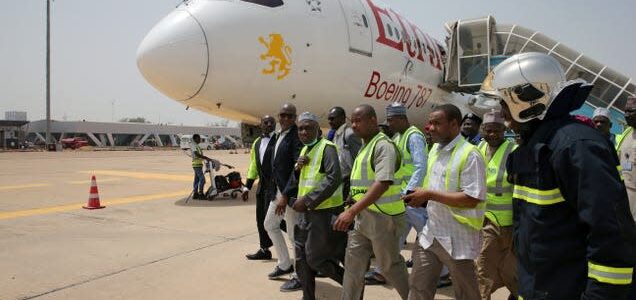
For a few weeks now, Nigeria’s president Muhammadu Buhari and his aviation minister have insisted that Nigeria Air, a new national carrier first announced in 2018, will begin operations this year with flights between Lagos and Abuja. The government scored a major win in September by getting Ethiopia Airlines to buy a 49% stake and be the carrier’s technical partner.
But the project’s take-off is being opposed by local airlines that say they were not “carried along” in the process that brought Ethiopian Airlines onboard. In October, Allen Onyema, CEO of Nigeria’s largest local airline Air Peace and the industry’s leading lobbyist, said it would be better for Nigeria Air to be wholly owned by Nigerians.

This week, a federal court in Lagos ordered the government to suspend its partnership with Ethiopian Airlines, based on a suit by eight local airlines including Air Peace. One of the demands of the suit was to declare that Ethiopian Airlines had no competence to bid for shares in Nigeria Air. Nigeria said it has been transparent all through and provided information to every interested party. “Stakeholders claiming they were not carried along are being unfair,” said aviation minister Hadi Sirika.
Nigeria Air is already four years behind schedule
The court order is a temporary injunction that could be overturned by another court. But it is the latest obstacle to Nigeria’s attempt to relaunch a national airline after the pre-independence Nigeria Airways collapsed in 2003 after years of mismanagement and debt.

The new Nigeria Air was announced in July 2018 to much fanfare at an aerospace exhibition in England, with plans to take-off December that year. It did not happen; the government suspended the project two months after announcing it. The episode sowed popular doubt that Nigeria could realize the ambition for a flag carrier.
But with Buhari on his way out as president, his government seems to have put the project together, the Ethiopian Airlines deal being the key marker. Unlike Nigerian Airways that was wholly owned by the government, the new version only reserved a 5% stake for the government. The remaining 46% is owned by private Nigerian.
If it goes ahead, Nigeria Air will enter the league of African national carriers that include Ethiopian Airlines, Kenyan Airways, RwandAir, and South African Airways. Ethiopian Airlines is Africa’s largest and profitable airline.
Credit: Yahoo News
